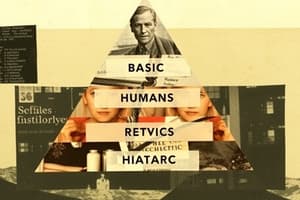Podcast
Questions and Answers
Shelter is only necessary to protect individuals from extreme temperatures and weather conditions.
Shelter is only necessary to protect individuals from extreme temperatures and weather conditions.
False (B)
Humans can survive without the need for reproduction.
Humans can survive without the need for reproduction.
False (B)
Clothing is primarily important for fashion purposes and social norms.
Clothing is primarily important for fashion purposes and social norms.
False (B)
Warmth is not crucial for maintaining a stable body temperature in humans.
Warmth is not crucial for maintaining a stable body temperature in humans.
Lack of sleep does not impact an individual's cognitive function.
Lack of sleep does not impact an individual's cognitive function.
If physiological needs are not met, individuals may face health problems but will not die.
If physiological needs are not met, individuals may face health problems but will not die.
Air is not considered a physiological need according to Maslow's Hierarchy of Needs.
Air is not considered a physiological need according to Maslow's Hierarchy of Needs.
Water is not essential for maintaining hydration and supporting bodily functions.
Water is not essential for maintaining hydration and supporting bodily functions.
Humans can survive for long periods without air due to adaptations in the body.
Humans can survive for long periods without air due to adaptations in the body.
Food is not necessary for providing the body with nutrients, vitamins, and minerals.
Food is not necessary for providing the body with nutrients, vitamins, and minerals.
Reproduction is considered a basic physiological need for human survival.
Reproduction is considered a basic physiological need for human survival.
Sleep is not part of the physiological needs according to Maslow's Hierarchy of Needs.
Sleep is not part of the physiological needs according to Maslow's Hierarchy of Needs.
Flashcards are hidden until you start studying
Study Notes
Physiological Needs
Physiological needs are the most fundamental requirements for human survival. They include access to air, water, food, shelter, reproduction, clothing, warmth, and sleep. Maslow's Hierarchy of Needs, proposed by psychologist Abraham Maslow, places physiological needs at the base of the hierarchy as they must be met before individuals can address higher-level needs such as safety, love/belongingness, esteem, and self-actualization.
Definition of Physiological Needs
Maslow's Hierarchy of Needs is a five-tier model that describes the human needs hierarchy. At the lowest level, physiological needs are considered the most basic and urgent. They are necessary for human survival and are divided into several subcategories, including air, water, food, shelter, reproduction, clothing, warmth, and sleep. These needs are essential for maintaining the bodily functions and health of the individual.
Examples of Physiological Needs
Air
Air is the most basic physiological need, as it is required for the human body to function properly. Without air, we cannot survive for long, as it provides oxygen, which is essential for respiration.
Water
Water is another critical physiological need. Humans need to drink enough water to maintain hydration and support various bodily functions, such as digestion, circulation, and elimination.
Food
Food is essential for providing the body with the necessary nutrients, vitamins, and minerals to function properly. Without food, we would die, as it provides the energy and building blocks for growth and repair.
Shelter
Shelter is required for protection from environmental factors such as extreme temperatures, weather conditions, and potential threats. It provides a safe space for individuals to rest and restore their energy.
Reproduction
Reproduction is a basic physiological need for the continuation of the species. Humans require a suitable environment and resources to reproduce and maintain the survival of the species.
Clothing
Clothing is essential for maintaining body temperature and protecting the skin from external factors such as sunlight, wind, and precipitation. It also provides a sense of modesty and social norms.
Warmth
Warmth is crucial for maintaining a stable body temperature, as humans can only survive within a certain range of temperatures. Inadequate warmth can lead to hypothermia and other health issues.
Sleep
Sleep is essential for physical and mental restoration, as it allows the body to recover from daily activities and consolidate memories. Lack of sleep can lead to health problems and impaired cognitive function.
Significance of Physiological Needs
Physiological needs are the foundation of Maslow's Hierarchy of Needs. They must be met before individuals can address higher-level needs. If these needs are not met, the body will break down, and individuals will die. Meeting these needs is essential for human survival and well-being.
Uses for Physiological Needs
Public Policy
Understanding the hierarchy of needs can help policy-makers target specific public needs, such as access to food, healthcare, and shelter. Prioritizing physiological needs is a good way to ensure that as many members of a society as possible are able to survive.
Electoral Campaigns
In electoral politics, emphasizing the importance of physiological needs can be an effective way for candidates to appeal to their audiences. For example, Herbert Hoover's campaign slogan "a chicken for every pot" emphasized food access, while Barack Obama highlighted the importance of healthcare.
Social Indices
Social indices, such as the Global Hunger Index, use physiological needs as a way to measure the state of human lives in a given region, country, or even around the world.
Making a Living
Having a job is often the most effective way for individuals to generate the income needed to provide for their physiological needs. When people have access to an income, they need to budget that income in such a way that they prioritize their physiological needs like food, shelter, and medical care.
In conclusion, understanding and addressing physiological needs is crucial for human survival and well-being. Maslow's Hierarchy of Needs provides a framework for understanding these needs and their importance in the context of human motivation and development.
Studying That Suits You
Use AI to generate personalized quizzes and flashcards to suit your learning preferences.




